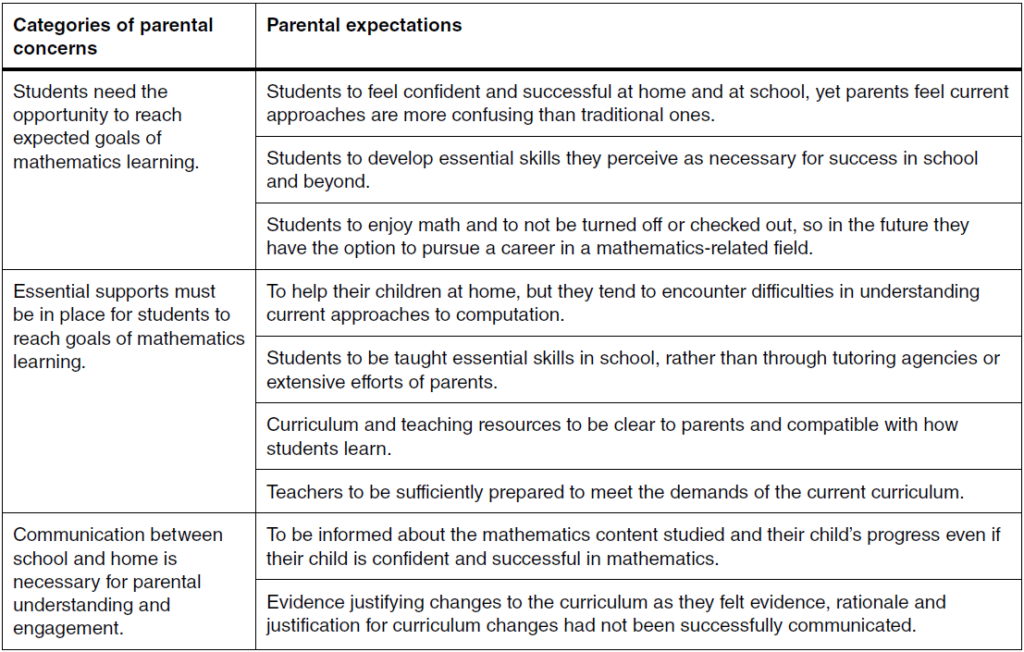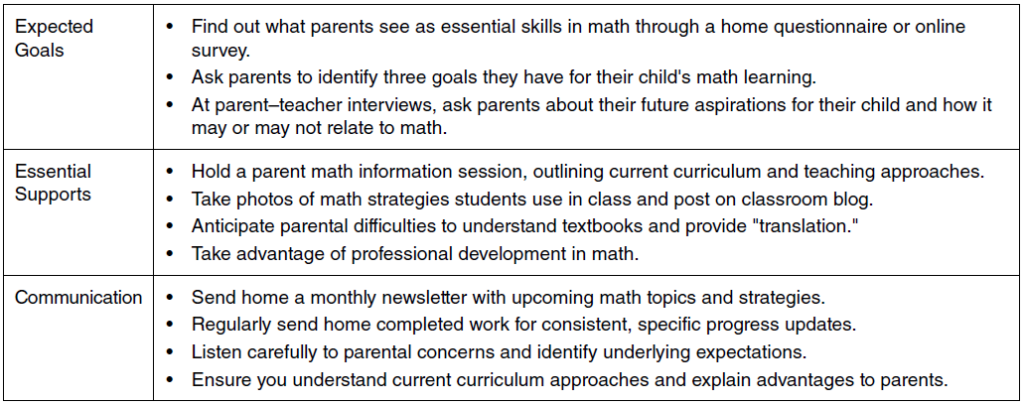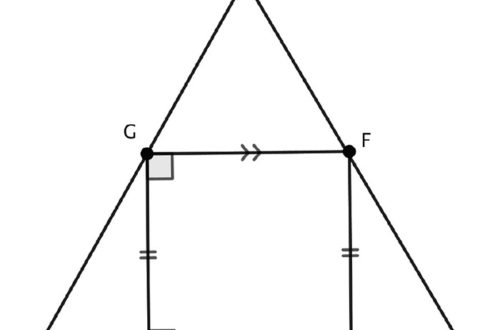Kylie Palfy, Janelle McFeetors, and Lynn McGarvey
It’s 3:30 PM, when a parent of one of my students pokes her head into my classroom and asks, “Um, can I talk to you about math?” This is not unexpected. I just began three-digit addition with the Grade 3 students and they are exploring different strategies. I know that some strategies are completely foreign to parents, so I’ve been anticipating the possibility of a parent visit and have had similar discussions in the past. In our conversation, the parent is frustrated because her child is regrouping after adding instead of “carrying the one like you’re supposed to.” She tells me she wants me to teach her child the “proper way” to add. How can I communicate with this parent, so she feels empowered to support her child’s mathematical learning?
It’s often hard for educators to communicate reforms and advantages to parents who experienced a more traditional mathematics education.
This scenario has likely been repeated thousands of times in elementary classrooms in Alberta and more broadly across North America for at least two decades. In mathematics, the difference between parents’ experiences of learning and their perceptions of their children’s learning has been an ongoing source of conflict. Current curriculum and teaching methods can be mysterious and confusing for parents (Marshall and Swan 2010). Additionally, it’s often hard for educators to communicate reforms and ad-vantages to parents who have experienced a more traditional mathematics education. Unfortunately, without understanding these approaches and the underlying rationale, parents may feel unable to sup-port their children’s learning at home and become critical of curriculum and pedagogy. Social media is rife with parents’ critiques of personal strategies, estimation and use of manipulatives.
Research also shows that parent involvement in children’s educational experiences increases achievement, improves motivation and reduces anxiety.
Despite these criticisms, research continues to demonstrate that reform-based curriculum and pedagogy have significant advantages over traditional approaches (for example, Boaler 2002; Henry and Brown 2008). Research also shows that parent involvement in children’s educational experiences in-creases achievement, improves motivation and reduces anxiety (Patall, Cooper and Robinson 2008). Parents are critical partners in education (Remillard and Jackson 2005). Therefore, we must continue teaching using research-informed, reform-based pedagogy and engaging productively with parents to enlist their support in their children’s mathematics education.
To more productively engage with parents, we endeavour to understand their critiques of current approaches to mathematics and identify expectations they hold for their children’s mathematical learning. We chose to listen to parents as they shared instances of their children’s and their own mathematics learning and why they valued mathematics learning in school. Rather than fielding parents’ comments at the end of the school day rush, our aim was to focus on parent voice and understand the nature of their concerns. To do so, we carried out a qualitative study where we hosted two-hour focus groups in 10 communities in north central Alberta with 38 parents of elementary school-aged children. The focus groups also allowed parents to consider others’ experiences and more fully develop their own stances during discussions around the table. To delve deeper, we also conducted individual follow-up interviews with 12 parents who had a range of strongly held perspectives on their children’s mathematics learning.
We view parents as intellectual resources and important education partners. In identifying parent expectations, we aim to acknowledge parent experiences as essential for fruitful dialogue and seek to find mutual concerns through which parents and teachers can support children’s learning. In this article, we identify nine parental expectations that were developed from analysis of comments shared during the focus groups and individual interviews. We believe that the expectations identified will help mathematics teachers in Alberta to more productively dialogue with parents and engender their support in mathematics learning.
Parental Expectations
Parents’ feelings toward mathematics ranged from enjoyment to acknowledgement of struggles and avoidance. Through the process of contrasting their own learning experiences with those of their children and sharing their goals for their children’s mathematics learning, the nine parental expectations outlined in Table 1 arose. Each parental expectation often relates to one or more of the three interconnected areas—expected goals, essential supports and communication — and were often framed by parents’ past experiences, their current realities and their hopes for their children’s future.
Reframing parental criticism of mathematics learning by identifying the underlying expectations will allow teachers to engage in thoughtful conversations, which respect parents’ personal experiences and empower parents to realize their agency in their children’s learning. To amplify parent voice, we share parents’ specific comments so that as a community of mathematics teachers we can reflect on the potency of listening closely to the words of parents who seek to support their children’s learning. We hope that the parents’ comments will enable reflection on the meaning of parents’ concerns removed from the pressure of particular circumstances and will highlight common hope among parents and teachers of children’s mathematics learning.
Expected Goals
Parents and teachers believe that students need the opportunity to reach expected goals of mathematics learning. While teachers’ goals for students are carefully outlined in the mathematics program of studies (Alberta Education 2016) and supported by other pedagogical documents (for example, NCTM 2000, 2014), parental goals and involvement have been less clearly delineated. Examples of parent comments illustrate each of the parental expectations related to expected goals.

Goal One
Parents expect their children to feel confident and successful at home and at school, yet they feel current approaches are more confusing than traditional ones.
I think because she was so frustrated, she thought she was bad at math when she was in Grade 3 and so I, you know, made extra effort to build her up again and give her the confidence and make her realize that she is really good at math. (Linh)
In this quote, Linh expresses anxieties about her daughter’s low self-confidence in mathematics due to perceived frustration with learning multiple strategies for computation. Her concerns mirror the expectation outlined in the mathematics program of studies (Alberta Education 2016) to ensure that students “use mathematics confidently to solve problems … appreciate and value mathematics” (p 2). Approaching Linh’s worries by letting her know that her daughter’s confidence in mathematics is also a priority for her teacher allows for a starting point from which to ad-dress her concerns and opens the possibility for Linh and the teacher to partner together to support the daughter. Additional pedagogic approaches could be used to incorporate number talks (Parrish 2010) as these help students develop confidence and fluency in computational strategies or low-floor/high-ceiling tasks (Gadanidis and Hughes 2011).
Goal Two
Parents expect their children to develop essential skills they perceive as necessary for success in school and beyond.
If we gave them time to understand that math is not just numbers, math is not just adding or subtracting, math is shapes and math is patterns and math is—it’s actually all these other things and get a real sense of an appreciation for that. (Leah)
I still think it’s really important that you memorize your times tables. Because in the future when you’re doing bigger math, I mean, you really need to know that stuff just off the top of your head. (Patricia)
That’s math to me, it’s taking whatever real-world situation you’re in and using math to get the answers that you need. So, it’s not about just memorizing the facts, it’s how are you going to apply them in a real-world situation! (Leslie)
As the previous quotes illustrate, what parents perceive as essential skills for mathematics learning varies greatly and may be based on their past and present experiences, or goals for their children’s academic future. However, recognizing that parents and teachers hold a mutual expectation of skill attainment allows for a common ground from which to discuss curriculum. Through a parent survey in the fall, teachers could determine what parents define as important skills and highlight opportunities for different skills development in monthly classroom newsletters.
Goal Three
Parents expect their children to enjoy math so that in the future they have the option to pursue a career in a mathematics-related field.
Because he loves every other subject except math, and I know that it closes a lot of the doors if you check out at the earliest that you can, because you need to have math all the way to Grade 12, if I’m not mistaken, to graduate. (Mandy)
Although Mandy’s son is only in Grade 4, she already expresses fears that he will not continue to pursue mathematics academically due to his dislike for the subject. Her anxieties revolve around his need to graduate high school, but many other parents of elementary schoolchildren had future fears that extended beyond high school graduation to post-secondary studies and future career opportunities.
I want them to appreciate, respect math and to understand it and be able to use it in whatever. Whether it’s your social sciences and they’re using it in terms of statistics and doing research, or whether it’s because they’re an engineer. (Rachel)
Rachel directly connects appreciation for and enjoyment of mathematics to career potential. Possible career paths were mentioned over 60 times during the interviews and represent an important expectation for parents. Parents did not hold the same level of concern in relation to other academic subject areas. The possible reason for this was expressed succinctly by Susan: “I think math is really the basic fundamental scale for the kids’ future.” Susan’s assertion seemed to be the motivation for many parents’ career-related concerns. Teachers must consider the possibility that this belief may be underlying parental criticism and share their own hopes and dreams for their students’ futures to more fully address concerns raised by parents.
While approaches to address goal one could be relevant in addressing goal three, teachers could consider more explicit connections between mathematics and careers. In partnering with parents, teachers could invite parents to share with the students in short presentations where they use mathematics in their specific careers. Or, if teachers are incorporating board games (McFeetors and Palfy 2018) in their mathematics classes, they could spotlight mathematicians as games designers in career possibilities (for example, Hamilton 2016).
Essential Supports
Parents’ second area of concern centred on the sup-ports they perceived as necessary for children to attain the expected goals, including supports parents could provide themselves as well as those provided by the teacher, school, governing educational bodies or teacher preparation programs. Parents expressed concerns that some of these essential supports were not present in their children’s mathematics education.
Support One
Parents expect to help their children at home, but they encounter difficulties in understanding current approaches to computational strategies.
When math homework comes home, I find out that they’re learning differently than I learnt. And it’s sometimes frustrating to try to help them at home when we’re teaching it different or try to help them. And it’s different than what the teachers are teaching them. So, it makes it a little difficult to help. (Wanda)
Many parents expressed similar frustrations. They want to help their children feel confident and successful in their mathematics learning, but they themselves are unsure of the methods and strategies being taught in the classroom. Parents who received such additional supports as teachers’ explanations of homework, examples of calculation or estimation strategies, or parent-information sessions felt more capable to support their children with homework.
Other parents stated that their children rarely receive math homework. These parents still identified many activities and strategies that they implement at home to support their children’s mathematics learning. These include playing card and board games; calculating payments and change; practicing measurement, multiplication and fractions while baking; calculating angles while playing sports; analyzing sports statistics; identifying patterns in their environment; calculating car speed during family trips; measuring fabric; and many other informal conversations related to mathematics. When teachers engage in discussion with parents about mathematics, it is important to recognize that parents expect to help their children formally and informally at home. Through productive dialogue with parents, teachers can leverage some of the activities that already occur at home to align with curricular objectives covered in the classroom. Additionally, more clearly articulating homework expectations and computation strategies can relieve some of the parents’ frustration when they attempt to support their children at home.
Support Two
Parents expect children to be taught essential skills in school, rather than at tutoring agencies or through extensive efforts of parents.
I have to supplement at home since Grade 1, 2, to feel like I’m keeping up with the other kids, the other parents who are all going to [tutoring agencies] apparently. But amongst my network of people, which is quite a lot of different schools … everybody seems to be supplementing. (Natalie)
While parents expect to support children at home, they do not expect to be primarily responsible for their child’s mathematics education. Some parents felt that the essential skills they had identified in goal two were not being adequately addressed in the class-room, thus requiring extensive intervention. When parents raise concerns of this nature, elementary school teachers must understand what essential skills parents feel are being missed. Once these have been identified, teachers can engage in discussion to find common goals and enlist parental support.
Support Three
Parents expect curriculum and teaching resources to be clear and compatible with how children learn.
I have difficulty reading it. It’s written in such a language, in such a strange convoluted language that I have trouble reading it. (Viktor referencing curriculum)
It was absolutely baffling to us. It was just—it made no sense whatsoever the way that it was written. (Faith referencing a textbook)
It’s frustrating as a parent to not be able to look at a workbook or whatever or look in the curriculum and understand what it’s saying so that I can help with something that I should know. (Meghan)
Parents often had difficulty deciphering curriculum and resources and found the subject-specific vocabulary challenging. Meghan shared a personal frustration with the word regrouping, which in her experience had always been referred to as carrying. In discussion with parents, it is important for elementary teachers to be cognizant of how much unfamiliar vocabulary is contained in curriculum and teaching resources. Teachers could try to translate mathematical terms into language that parents can more readily understand. In anticipation of a new Alberta mathematics curriculum (Learn Alberta 2018), teachers could use school-based professional development time to simultaneously create parent resources—like one-page overviews for each essential understanding per grade—to help parents understand new learning outcomes while planning for new expectations of learning in the classroom.
Support Four
Parents expect teachers to be sufficiently prepared to meet the demands of the current curriculum.
Well I think that there needs to be more education for teachers on how to get the outcomes that they want. (Dan)
I don’t think that most elementary teachers of math know what math is about. Kinds of things that are encompassed by the phrase mathematics. (Tom, parent and mathematician)
Several parents expressed concerns about elementary schoolteachers’ level of mathematics education and understanding. While individual classroom teachers cannot be responsible for teacher preparation programs, they can ensure that they themselves are adequately prepared to tackle mathematics curriculum in their classroom. At the school and district levels, administrators can organize professional development activities in mathematics to enhance teacher capacity and improve student performance. Teachers could request Alberta Education to continue financial investment in initiatives like the math bursary to enrol in university courses to learn and grow a network of colleagues provincially as resources. Additionally, elementary teacher education programs could also implement mathematical knowledge for teaching courses for future teachers (for example, Stylianides and Stylianides 2010).
Kilpatrick, Swafford and Findell (2001, 132) believe “it is critical that they [students] encounter good mathematics teaching in the early grades.” We believe that good teaching requires well-prepared and confident classroom teachers. Taking steps to ensure this at the individual-teacher, school, district, state or provincial and university levels will not only assuage parents’ fears but will also improve students’ learning opportunities.
Communication
Effective communication is the key to ensuring that many of the essential supports parents identify are present. Parents specifically identified two expectations related to communication that they felt would expand their understanding of curriculum and improve their ability to support their children.
Communication One
Parents expect to be informed about the mathematics content studied and their child’s progress even if their child is confident and successful in mathematics. Information about the topics their children were currently learning would help parents have conversations at home, and information about progress would help parents know when they need to provide more specific help for their child to succeed.
I need the support of the communication. I need to know what unit he’s on. I need to know what level he’s on. I know they can measure things in terms of, you know, expected grade level out-comes. (Kristine)
Although some parents felt that classroom communication was lacking, others expressed satisfaction with the level of home–school communication. Some communication methods that were repeatedly referred to as helpful were year-plan outlines, monthly news-letters, parent–teacher interviews, e-mail, classroom websites and regular homework. Teachers would benefit by determining the most effective form of communication with their parent community. Overall, parents felt that consistent communication was the key to supporting their children at home.
Communication Two
Parents expect evidence justifying changes to the curriculum as they felt evidence, rationale and justification for curriculum changes had not been successfully communicated.
I think one thing that was lacking for me as a parent was feeling that a solid rationale had been provided to me for why this is the better way to do math. (Elise)
Quite frequently, parents asserted that they would feel more comfortable supporting curriculum expectations and pedagogical strategies if they understood why the methods they experienced in school had changed. Elementary school teachers and administrators should take steps to ensure that evidence, rationale and justification for curriculum changes are successfully communicated to parents to garner their support. Many research-based professional articles can be used to develop an evidence-based rationale, especially for computational strategies (for example, Baek 2006; Crespo, Kyriakides and McGee 2005; Kamii, Lewis and Livingston 1993). This could be achieved through direct teacher-to-parent communication or through more formal school mathematics information sessions.
Conclusion
A primary goal of mathematics education is to en-sure that “students have the opportunity to become proficient with mathematical knowledge and confident in their ability to learn and make sense of mathematics” (NCTM 2014, 110). Understanding parental expectations and enlisting their support in their children’s education is essential in ensuring that this goal is achieved. We suggest that teachers consider the three areas of parental expectations outlined in this article as they plan for their school year. Figure 1 provides some examples of actions that teachers could take to engage with and better understand the parents of their students. These common-sense actions along with an understanding of the nine parental expectations out-lined in this article create a foundation from which teachers can begin to assuage parental fears, identify common goals and enlist parental support.

References
Alberta Education. 2016. Mathematics Kindergarten to Grade 9 Program of Studies. Edmonton, Alta: Alberta Education.
Baek, J M. 2006. “Children’s Mathematical Understanding and Invented Strategies for Multidigit Multiplication.” Teaching Children Mathematics 12, no 5: 242–47.
Boaler, J. 2002. Experiencing School Mathematics: Traditional and Reform Approaches to Teaching and Their Impact on Student Learning. Mahwah, NJ: Lawrence Erlbaum.
Crespo, S, A O. Kyriakides and S McGee. 2005. “Nothing ‘Basic’ about Basic Facts: Exploring Addition Facts with Fourth Graders.” Teaching Children Mathematics 12, no 2: 60–67.
Gadanidis, G, and J M Hughes. 2011. “Performing Big Math Ideas Across the Grades.” Teaching Children Mathematics 17, no 8: 486–96.
Hamilton, G. 2016. “Dr Gordon Hamilton–Santorini and a Mathematician.” YouTube video, 7:50. Sentry Box. www.youtube.com/watch?v=dKMOmkxr7-8&feature=youtu.be (accessed January 20, 2021).
Henry, V J, and R S Brown. 2008. “First-Grade Basic Facts: An Investigation into Teaching and Learning of an Accelerated, High-Demand Memorization Standard.” Journal for Research in Mathematics Education 39, no 2: 153–83.
Kamii, C, B A Lewis and S Jones Livingston. 1993. “Primary Arithmetic: Children Inventing Their Own Procedures.” The Arithmetic Teacher 41, no 4: 200–203.
Kilpatrick, J, J Swafford and B Findell. 2001. Adding It Up: Helping Children Learn Mathematics. Washington, DC: National Academy Press.
Learn Alberta. 2018. Mathematics Draft Curriculum. https://new.learnalberta.ca/?x=A19298DA (accessed January 20, 2021).
McFeetors, P J, and K Palfy. 2018. “Educative Experiences in a Game Context: Supporting Emerging Reasoning in Elementary School Mathematics.” Journal of Mathematical Behavior 50, 103–25.
Marshall, L, and P Swan. 2010. “Parents as Participating Partners.” Australian Primary Mathematics Classroom 15 (3): 25–32.
National Council of Teachers of Mathematics (NCTM). 2000. Principles and Standards for School Mathematics. Reston, Va: National Council of Teachers of Mathematics.
———. 2014. Principles to Actions: Ensuring Mathematical Success for All. Reston, Va: National Council of Teachers of Mathematics.
Parrish, S. 2010. Number Talks: Helping Children Build Mental Math and Computation Strategies, Grades K–5. Sausalito, Calif: Math Solutions.
Patall, E A., H Cooper and J C Robinson. 2008. “Parent Involvement in Homework: A Research Synthesis.” Review of Educational Research 78, no 4: 1039–101.
Remillard, J T, and K Jackson. 2006. “Old Math, New Math: Parents’ Experiences with Standards-Based Reform.” Mathematical Thinking and Learning 8, no 3: 231–59.
Stylianides, G J, and A J Stylianides. 2010. “Mathematics for Teaching: A Form of Applied Mathematics.” Teaching and Teacher Education 26, no 2: 161–72.
Kylie Palfy is an elementary schoolteacher currently working as an interchange participant and curriculum consultant for the Government of Alberta. She also works as a sessional instructor in mathematics education at the University of Alberta. Her passion is helping students and teachers fall in love with mathematics and develop confidence in themselves as mathematics teachers and learners.
Janelle McFeetors is an associate professor of elementary mathematics education at the University of Alberta. Her research interests include strengthening home–school connections for mathematics learning, designing playful moments of mathematics learning through board games, and students’ development of mathematical processes, particularly mathematical reasoning.
Lynn McGarvey is a mathematics education professor at the University of Alberta. Her research focuses primarily on mathematical understanding within the context of spatial and algebraic reasoning.






